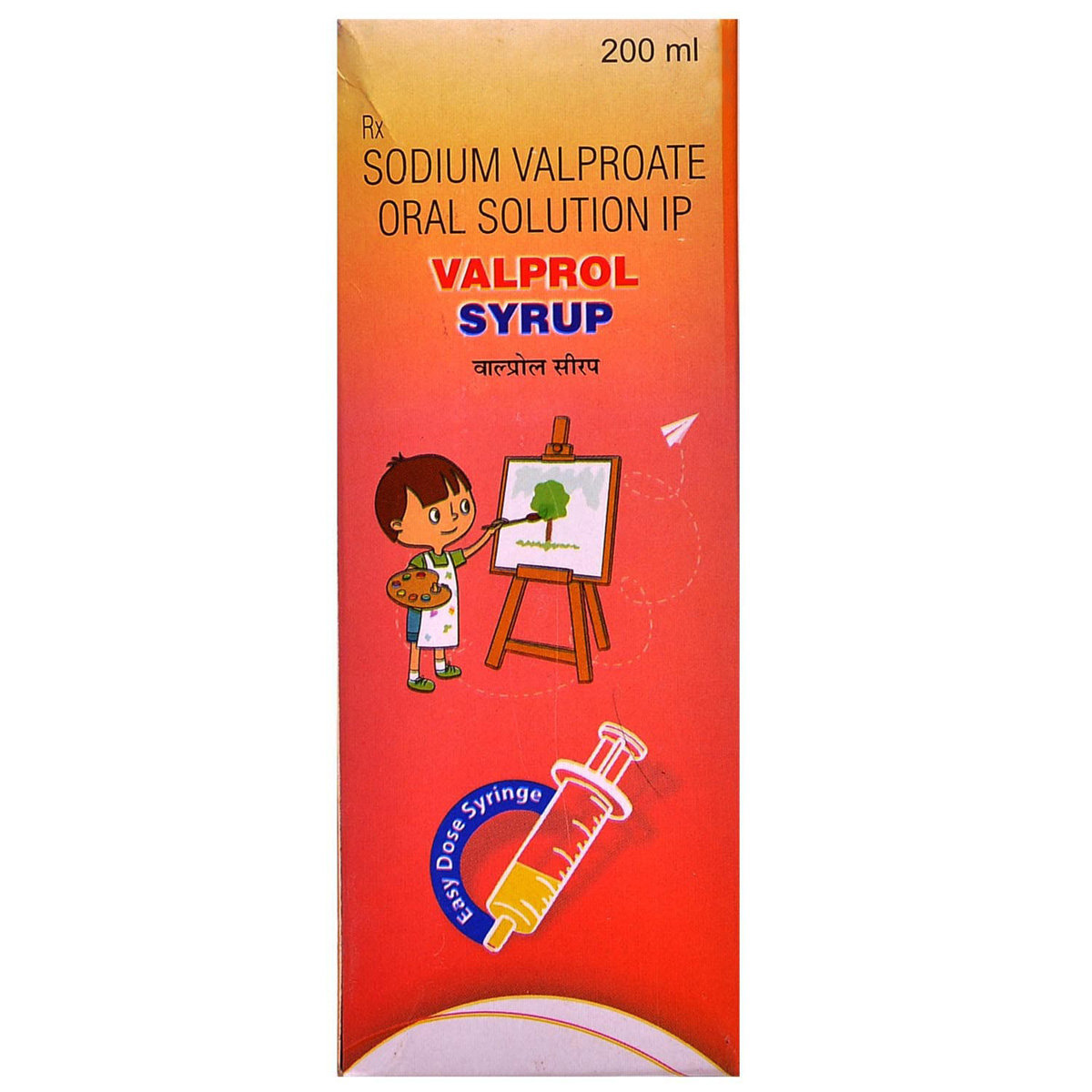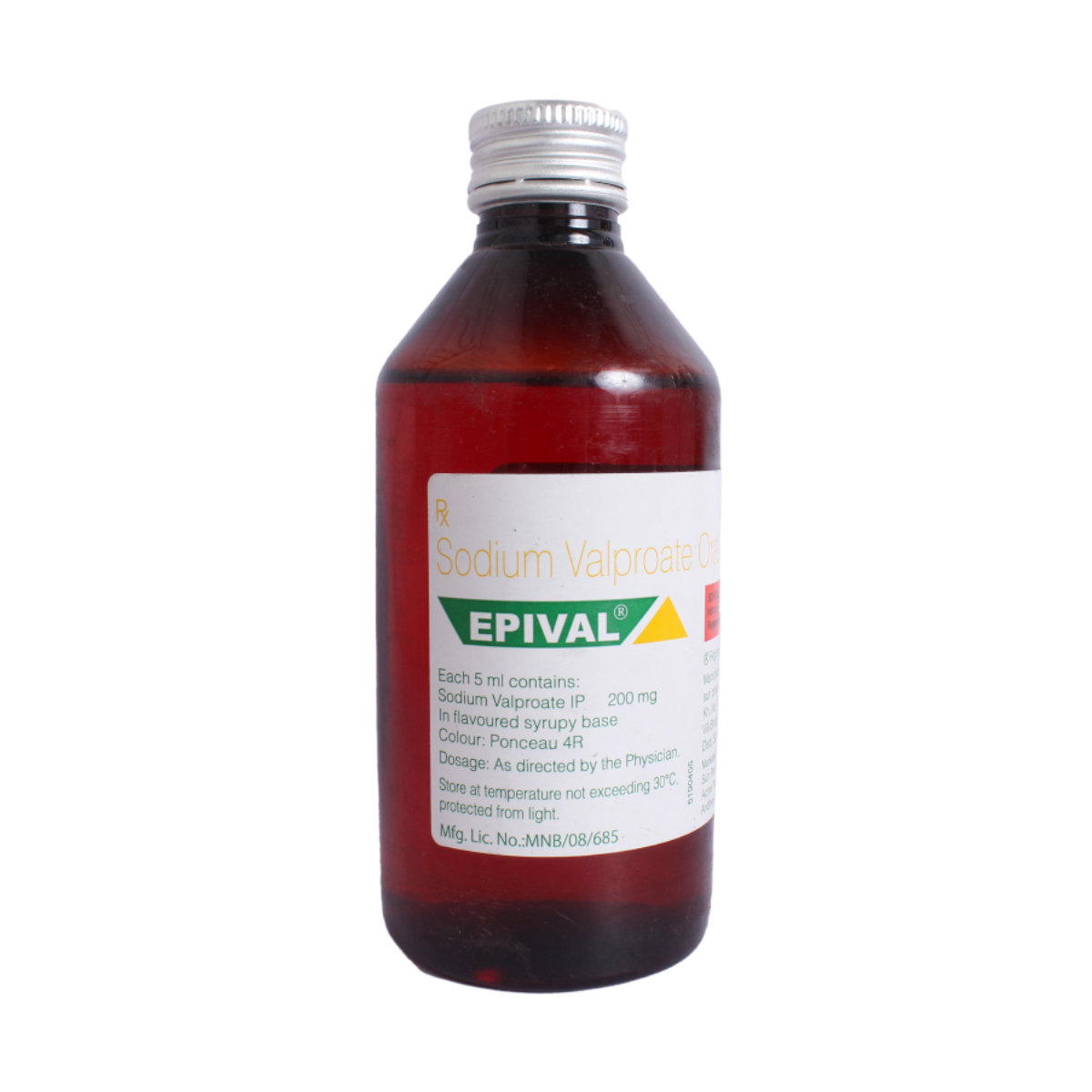Soval Syrup 200 ml
MRP ₹136
(Inclusive of all Taxes)
₹20.4 Cashback (15%)
Provide Delivery Location
Online payment accepted
 Prescription drug
Prescription drugWhats That
Composition :
Manufacturer/Marketer :
Consume Type :
Expires on or after :
Return Policy :
NPPA :
About Soval Syrup
Soval Syrup belongs to the group of medicines called anticonvulsants or anti-epileptics used to treat epilepsy/seizures/fits. Additionally, Soval Syrup is also used to treat bipolar disorder and prevent symptoms of migraine (like a headache). Epilepsy is a sudden rush of electricity in the brain. In epilepsy, the brain's electrical rhythms become imbalanced, resulting in recurrent seizures, sometimes leading to an unconscious state.
Soval Syrup contains 'Sodium valproate', which decreases the excessive and abnormal nerve activity in the brain. Thereby helps in controlling seizures. Soval Syrup increases the amount of a chemical substance called GABA; this helps block the nerve transmission across the brain and provides a calming effect. Thereby helps treat bipolar disorder.
You can take Soval Syrup with or without food. You are advised to take Soval Syrup for as long as your doctor has prescribed it for you depending on your medical condition. In some cases, you may experience certain common side-effects such as stomach pain, nausea, vomiting, dry mouth, tremors, tiredness, sleepiness, headache, weight gain, and hair loss. Most of these side-effects do not require medical attention and will resolve gradually over time. However, you are advised to talk to your doctor if you experience these side-effects persistently.
Please do not stop taking Soval Syrup without consulting your doctor to avoid worsening of seizures. Contact your doctor if your child gets her first-period whilst on treatment with Soval Syrup . Do not take Soval Syrup if you are pregnant as it could cause serious congenital disabilities. If you are of child-bearing age, use effective contraception while taking Soval Syrup . Consult your doctor before taking Soval Syrup if you are breastfeeding. Do not drive or operate machinery as Soval Syrup may cause drowsiness and dizziness. Avoid consuming alcohol along with Soval Syrup as it could lead to increased dizziness and sleepiness.
Uses of Soval Syrup
Directions for Use
Key Benefits
Soval Syrup belongs to a group of anticonvulsants or anti-epileptics used to treat epilepsy (fits). Additionally, Soval Syrup is also used to treat bipolar disorder and prevent migraine headaches. Soval Syrup decreases the excessive and abnormal nerve activity in the brain, thereby controlling seizures. Soval Syrup is used to treat both localized (seizures which affect only a part of the brain) and generalized seizures (seizures which affect the entire brain).
Storage
Drug Warnings
Do not take Soval Syrup if you are allergic to any of its contents; if you have liver problems, porphyria, urine-related problems (like urea cycle disorder), diabetes, immune system disorder or kidney problems. Consult your doctor immediately if you experience suicidal tendencies while taking Soval Syrup . Contact your doctor if your child gets her first period during the treatment with Soval Syrup . Do not take Soval Syrup if you are pregnant unless prescribed by the doctor as it is pregnancy category C medicine and can cause serious congenital disabilities. Consult your doctor before taking Soval Syrup if you are breastfeeding. Soval Syrup may cause drowsiness and dizziness, so drive only if you are alert. Avoid consuming alcohol along with Soval Syrup as it could lead to increased dizziness and sleepiness.
Diet & Lifestyle Advise
- A ketogenic diet (low in carbohydrates and high in fats) is recommended for children with epilepsy. This diet helps in utilizing fat instead of glucose for the generation of energy.
- Atkins diet (high fat and controlled carbohydrates) is recommended for adolescents and adults.
- Exercising regularly helps in maintaining weight and improving overall health.
- Rest well; get plenty of sleep.
- Avoid smoking and alcohol consumption.
- Meditation and yoga can help lower stress, decrease pain sensitivity and improves coping skills.
- Have a seizure response plan that helps those around you know what to do.
- Prepare your living area; small changes may help in reducing the risk of physical injury during a seizure.
- Understand what triggers seizures and try reducing or avoiding them.
- Please pay attention to overall health as it can help in reducing seizure activity.
- Install an alarm or emergency device to get assistance during a seizure attack.
Side Effects of Soval Syrup
- Stomach pain
- Nausea
- Vomiting
- Dry mouth
- Tremors
- Tiredness
- Sleepiness
- Headache
- Weight gain
- Hair loss
Habit Forming
Therapeutic Class
All Substitutes & Brand Comparisons
RX
Out of StockVikorate Syrup
Kivi Labs Ltd
₹118.72
(₹0.53/ 1ml)
13% CHEAPERRX
Out of StockValpep 200mg Syrup
₹119
(₹0.54/ 1ml)
11% CHEAPERRX
Out of StockVelpep Syrup
₹126
(₹0.57/ 1ml)
6% CHEAPER
Author Details
We provide you with authentic, trustworthy and relevant information
FAQs
Drug-Drug Interactions Checker List
- ASPIRIN
- PHENOBARBITAL
- PHENYTOIN
- PRIMIDONE
- CARBAMAZEPINE
- TOPIRAMATE
- ACETAZOLAMIDE
- LAMOTRIGINE
- FELBAMATE
- WARFARIN
- ZIDOVUDINE
- LOPINAVIR
- RITONAVIR
- MOCLOBEMIDE
- SELEGILINE
- LINEZOLID
- AMITRIPTYLINE
- SERTRALINE
- QUETIAPINE
- OLANZAPINE
- RISPERIDONE
- NIMODIPINE
- PROPOFOL
- ESTROGEN
- LEVONORGESTREL
- MEFLOQUINE
- CHLOROQUINE
- CIMETIDINE
- IMIPENEM
- MEROPENEM
- RIFAMPICIN
- ERYTHROMYCIN
- CLONAZEPAM
- DIAZEPAM
- CHOLESTYRAMINE
Special Advise
- Contact your doctor if your child gets her first-period whilst on treatment with Soval Syrup .
- Soval Syrup might affect blood and urine tests. Inform the person doing the tests that you are taking Soval Syrup .
- If you are of child-bearing age, use effective contraception without interruptions during your entire treatment with Soval Syrup .
- Consult your doctor immediately if you become pregnant while taking Soval Syrup .
Disease/Condition Glossary
Epilepsy: Epilepsy is a sudden rush of electricity in the brain. It is a disorder of the nervous system which occurs due to disturbed nerve cell activity in the brain. In epilepsy the brain's electrical rhythms become imbalanced, resulting in recurrent seizures. In patients with seizures, the typical brain electrical pattern is disrupted by sudden bursts of electrical impulses that affect an individual's consciousness, movements or sensations. Seizures are of two types: generalized and partial seizures. Generalized seizures affect the entire brain, whereas partial seizures affect only a part of the brain. Seizures can cause uncontrollable muscle twitches and spasms. Stronger seizures may cause people to become confused or unconscious. Possible causes include high fever, trauma, genetic disorder, brain injury or stroke.
Bipolar disorder: Bipolar disorder, also known as manic depression or bipolar disease, is a mental health disorder associated with episodes of mood swings ranging from manic highs to depressive lows.

Have a query?
Alcohol
Safe if prescribed
Avoid consumption of alcohol while taking Soval Syrup as it may cause increased dizziness and sleepiness.
Pregnancy
Consult your doctor
Soval Syrup belongs to pregnancy category D. Avoid taking Soval Syrup if you are pregnant as it could lead to serious birth defects.
Breast Feeding
Consult your doctor
Soval Syrup may pass into breastmilk. Consult your doctor before taking Soval Syrup if you are breastfeeding.
Driving
Safe if prescribed
Soval Syrup causes dizziness, sleepiness and tiredness. Do not drive or operate machinery unless you are alert.
Liver
Consult your doctor
Soval Syrup should not be used if you have liver problems or your family has a history of liver problems. Please consult your doctor if you have any concerns regarding this.
Kidney
Consult your doctor
Dose adjustment may be needed in patients with kidney impairment. Please consult your doctor if you have kidney impairment or any concerns regarding this.
Children
Safe if prescribed
Soval Syrup can be given to children if prescribed by the doctor. The dose will be adjusted by the doctor depending upon the child's body weight.








_0.jpg?tr=q-85)

